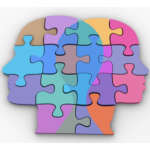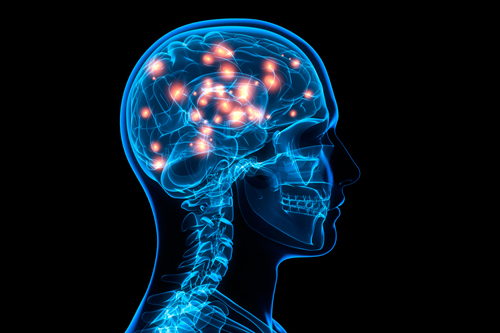Many of us on the Rewire Me staff are what you might call neuroscience nerds. We love digging in to the latest research on the brain and thinking about how it could improve people’s lives. So we couldn’t resist listening in on the presentations at “Neuroscience 2013,” a conference that brought together 30,000 neuroscientists from around the world. Among many fascinating findings, these intrigued us the most:
 Sex Differences in Brain, Behavior, and Health probed the wide-ranging differences in the female and male brains and the dramatic ways that hormones affect brain function. In particular, studies on estrogen revealed how it might safeguard postmenopausal women against memory loss caused by stress, as well as how that hormone affects the brain circuits of both men and women. Also discussed: the possibility of preserving memory and attention in postmenopausal women with the drug tamoxifen, whose effects are similar to estrogen without the cancer risks.
Sex Differences in Brain, Behavior, and Health probed the wide-ranging differences in the female and male brains and the dramatic ways that hormones affect brain function. In particular, studies on estrogen revealed how it might safeguard postmenopausal women against memory loss caused by stress, as well as how that hormone affects the brain circuits of both men and women. Also discussed: the possibility of preserving memory and attention in postmenopausal women with the drug tamoxifen, whose effects are similar to estrogen without the cancer risks.
 The Human Brain: Lessons from the Animal Kingdom featured research on species ranging from the lowly slug to our closer monkey relatives that sheds light on how the human brain works. The nine-banded armadillo may bring us closer to new treatments for progressive blindness. Baboons are showing us a genetic basis for the folds in our brain, which may advance the treatment of certain congenital neurological diseases. And we’re learning more about human decision making thanks to similarities between the brains of humans and monkeys. Even research on fruit flies is teaching us about ourselves: It shows how the inability to control the “volume” of stimuli contributes to conditions like autism and schizophrenia.
The Human Brain: Lessons from the Animal Kingdom featured research on species ranging from the lowly slug to our closer monkey relatives that sheds light on how the human brain works. The nine-banded armadillo may bring us closer to new treatments for progressive blindness. Baboons are showing us a genetic basis for the folds in our brain, which may advance the treatment of certain congenital neurological diseases. And we’re learning more about human decision making thanks to similarities between the brains of humans and monkeys. Even research on fruit flies is teaching us about ourselves: It shows how the inability to control the “volume” of stimuli contributes to conditions like autism and schizophrenia.
 Brain Wellness presented a collection of studies addressing how lifestyle changes affect how we age. We all know that exercise helps maintain our health, but now neuroscientists have demonstrated how it can prevent, diminish, and even reverse some of the symptoms of old age, particularly limited mobility. Beyond mobility, lab experiments with older rats showed how exercise improved blood flow and memory function. And the benefits don’t come just from exercise. “Couch potatoes can rejoice,” proclaimed Michael Salvatore, Ph.D., of Louisiana State University Health Sciences Center. “Our results show that a restricted diet alone could help prevent some of the movement effects of aging.”
Brain Wellness presented a collection of studies addressing how lifestyle changes affect how we age. We all know that exercise helps maintain our health, but now neuroscientists have demonstrated how it can prevent, diminish, and even reverse some of the symptoms of old age, particularly limited mobility. Beyond mobility, lab experiments with older rats showed how exercise improved blood flow and memory function. And the benefits don’t come just from exercise. “Couch potatoes can rejoice,” proclaimed Michael Salvatore, Ph.D., of Louisiana State University Health Sciences Center. “Our results show that a restricted diet alone could help prevent some of the movement effects of aging.”
 In Sickness and in Health focused on the relationship between diet and brain function. Especially fascinating was how targeted repetitive transcranial magnetic stimulation (rTMS), an emerging therapy that uses powerful, focused magnetic field pulses to stimulate brain regions noninvasively, reduced the symptoms of severe eating disorders. Half of the study’s participants improved by more than 50%, and a third showed an 80% to 100% reduction in symptoms after treatment. Researchers also found a common link between binge eating and impulsive behavior in rats: an imbalance in the brain’s serotonin system. Noelle Anastasio, Ph.D., of the Center for Addiction Research at the University of Texas Medical Branch explained that when it comes to humans, “Our research suggests that the use of medications to fine-tune the brain’s serotonin system may allow us to correct problems associated with both impulsive behavior and uncontrolled eating.”
In Sickness and in Health focused on the relationship between diet and brain function. Especially fascinating was how targeted repetitive transcranial magnetic stimulation (rTMS), an emerging therapy that uses powerful, focused magnetic field pulses to stimulate brain regions noninvasively, reduced the symptoms of severe eating disorders. Half of the study’s participants improved by more than 50%, and a third showed an 80% to 100% reduction in symptoms after treatment. Researchers also found a common link between binge eating and impulsive behavior in rats: an imbalance in the brain’s serotonin system. Noelle Anastasio, Ph.D., of the Center for Addiction Research at the University of Texas Medical Branch explained that when it comes to humans, “Our research suggests that the use of medications to fine-tune the brain’s serotonin system may allow us to correct problems associated with both impulsive behavior and uncontrolled eating.”
 Tuning the Brain: Music and Hearing showcased findings linking musical training to the structure and function of various brain regions. These insights suggest potential new roles for music, including as an alternative tool in education and as a treatment for learning disabilities. Early music lessons, before age seven, have the greatest effect on adult brain anatomy, particularly in regions that influence language skills and executive function. Long-term musical training, on the other hand, improves the brain’s ability to adapt and enhances its capacity to integrate information from all senses into an understandable whole.
Tuning the Brain: Music and Hearing showcased findings linking musical training to the structure and function of various brain regions. These insights suggest potential new roles for music, including as an alternative tool in education and as a treatment for learning disabilities. Early music lessons, before age seven, have the greatest effect on adult brain anatomy, particularly in regions that influence language skills and executive function. Long-term musical training, on the other hand, improves the brain’s ability to adapt and enhances its capacity to integrate information from all senses into an understandable whole.
 Depression: Susceptibility and Treatment highlighted research that could result in significant changes in how depression and anxiety are diagnosed and treated. Among the most important findings: A molecule produced and secreted by white blood cells in the immune system may serve as a biomarker for depression. If so, artificially reducing this molecule could help treat the illness. Other research found that decreasing a chemical signal in the amygdala, a part of the brain associated with emotional processing, may hold further hope for those who suffer from depression.
Depression: Susceptibility and Treatment highlighted research that could result in significant changes in how depression and anxiety are diagnosed and treated. Among the most important findings: A molecule produced and secreted by white blood cells in the immune system may serve as a biomarker for depression. If so, artificially reducing this molecule could help treat the illness. Other research found that decreasing a chemical signal in the amygdala, a part of the brain associated with emotional processing, may hold further hope for those who suffer from depression.
 Navigating Social Ladders delved into how our position in social hierarchies influences everything from decision making and altruism to physical and mental health. In one study, rats living in disrupted societies produced fewer new brain cells than rats living in stable societies. Other research found that people with many friends have certain brain regions that are bigger and better connected than those of people with fewer friends. This research may ultimately yield more effective treatments for mental illness—and may also influence how we construct social hierarchies at work and school.
Navigating Social Ladders delved into how our position in social hierarchies influences everything from decision making and altruism to physical and mental health. In one study, rats living in disrupted societies produced fewer new brain cells than rats living in stable societies. Other research found that people with many friends have certain brain regions that are bigger and better connected than those of people with fewer friends. This research may ultimately yield more effective treatments for mental illness—and may also influence how we construct social hierarchies at work and school.

Rose Caiola
Inspired. Rewired.




3 Comments
Debbie Roth
Interesting information, thank you for sharing.
Mr. Turner
I agree, very intriguing. Especially in the “Brain Wellness” and “In Sickness and in Health” section. I would be very interested in getting additional information.
Holly Scott
Thank you for sharing the information on targeted repetitive transcranial magnetic stimulation (rTMS) and its use in treating eating disorders (EA). EA’s can be one of the most difficult disorders to treat. Love to see any type of advances in this area.